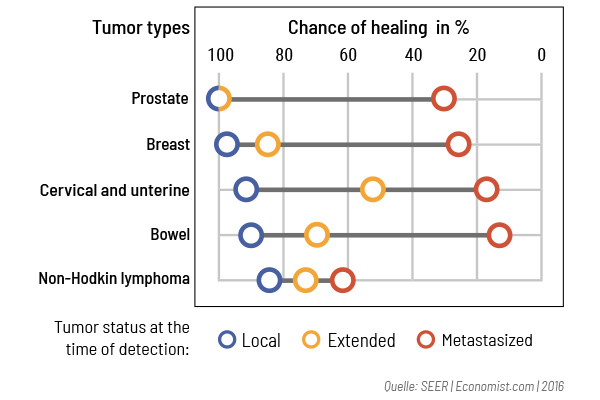Every human being is unique and genetically different from others. This is reflected in appearance, special talents, and personality, but also in the genetic predisposition to various diseases, such as tumors or cardiovascular diseases. If you know your genetic risk factors, you can actively contribute to preventing or delaying a disease‘s onset or alleviating its symptoms.
Genetic risk factors play an important role in many diseases that frequently occur in our society. However, an individual genetic predisposition to a disease is not necessarily an inevitable fate. Environmental factors such as lifestyle, diet, and exercise may also influence whether a genetic disease breaks out or the affected person remains healthy.
The genetic screening results are, therefore, a guide to health-conscious living. They enable recommendations such as participation in early detection programs for diseases, an adjustment of lifestyle or medication, e.g., to prevent thrombosis on long-distance flights. Therefore, early identification of genetic risk factors and taking preventive measures are important for health promotion.
Are you insured in Germany? Our colleagues at the Zentrum für Humangenetik Tübingen will gladly support you!
What We Offer with This Panel
Our Promise to You
General Information
It is possible to request single or multiple predefined gene sets. In addition to the complete analysis of the genes of the requested gene set, we extend the analysis to all genes of the diagnostic panel upon request.
Material
- 1-2 ml EDTA blood or 1-2 µg genomic DNA
- Order Form with declaration of consent
Turnaround Time
- Turnaround Time: 4 weeks
Costs
The prices for our human genetic diagnostics depend on the size of the selected diagnostic panel and the selected gene sets. All prices include sequencing, bioinformatic analysis, and issuing of a medical report by our team of experts in human genetic diagnostics.
Sample Report
Early Detection of Tumor Diseases Increases Survival Rate Drastically
For tumor diseases, the following applies: the earlier a tumor is detected, the better the prognosis. The figure illustrates this principle using five different tumor entities. If the tumor is diagnosed during the early stages (local), the chances of surviving for five years or longer is 80% to 100%. Survival rates significantly decrease if the tumor is detected after it has metastasized. CeGaT‘s screening panel checks whether you are at increased risk for tumor disease and should therefore take intensified early detection measures.
Modules of the Disease Prevention Panel
The individual modules of CeGaT‘s Disease Prevention Panel contain genes that have been scientifically confirmed as risk genes and pose a risk of disease that can be reduced by timely detection or adequate prevention. The compilation of genes is based on the recommendations of the American College of Medical Genetics and Genomics (ACMG) and has been supplemented by our specialists with other known risk genes.
Gene Sets of the Disease Prevention Panel
Tumor Diseases (PRV01, 51 Genes)
APC, ATM, AXIN2, BAP1, BARD1, BMPR1A, BRCA1, BRCA2, BRIP1, CDC73, CDH1, CDKN2A, CHEK2, DICER1, EPCAM, FH, FLCN, KIT, MEN1, MET, MLH1, MSH2, MSH6, NF1, NF2, PALB2, PDGFRA, PMS2, POLD1, POLE, PTCH1, PTEN, RAD51C, RAD51D, RB1, RET, SDHA, SDHAF2, SDHB, SDHC, SDHD, SMAD4, SMARCA4, SMARCB1, STK11, TMEM127, TP53, TSC1, TSC2, VHL, WT1
Cardiovascular Diseases (PRV02, 55 Genes)
ACTA2, ACTC1, ACVRL1, ALPK3, BAG3, BMPR2, CALM1, CALM2, CALM3, CASQ2, COL3A1, DES, DSC2, DSG2, DSP, EMD, ENG, FBN1, FHL1, FLNC, GDF2, JUP, KCNH2, KCNK3, KCNQ1, LAMP2, LMNA, LOX, MYBPC3, MYH11, MYH7, MYL2, MYL3, MYLK, PKP2, PLN, PRKAG2, PRKG1, RBM20, RYR2, SCN5A, SMAD3, SMAD9, TBX4, TECRL, TGFB2, TGFBR1, TGFBR2, TMEM43, TNNC1, TNNI3, TNNT2, TPM1, TTN, TTR
Thrombosis and Coagulation Disorders (PRV03, 28 Genes)
ADAMTS13, F10, F11, F12, F13A1, F13B, F2, F5, F7, F8 (intronic inversions not covered), F9, GFI1B, GP1BA, GP1BB, GP6, GP9, HRG, ITGA2B, ITGB3, LMAN1, MCFD2, NBEAL2, PROC, PROS1, SERPINC1, SERPIND1, SERPINF2, VWF
Iron and Copper Storage Disorders (PRV04, 8 Genes)
ATP7B, CP, GLRX5, HAMP, HFE, HJV, SLC40A1, TFR2
Hypercholesterolaemia (PRV05, 4 Genes)
APOB, LDLR, LDLRAP1, PCSK9
Glaucoma (PRV06, 2 Genes)
CYP1B1, MYOC
Malignant Hyperthermia (Anaesthesia Intolerance) (PRV07, 2 Genes)
CACNA1S, RYR1
Pharmacogenetics (PRV08, 22 Genes)
ABCG2, CACNA1S, CYP2B6, CYP2C19, CYP2C9, CYP2D6, CYP3A4, CYP3A5, CYP4F2, DPYD, G6PD, HLA-A, HLA-B, IFNL3, MT-RNR1, NUDT15, POR, RYR1, SLCO1B1, TPMT, UGT1A1, VKORC1
Familial Diabetes (PRV09, 5 Genes)
GCK, HNF1A, HNF1B, HNF4A, PDX1
Further Information
Dr. Stefanie Wendel talks about the advantages and possible applications of the Disease Prevention Panel.
Contact Us
Do you have a question, or are you interested in our service?
Diagnostic Support
We will assist you in selecting the diagnostic strategy – for each patient.





